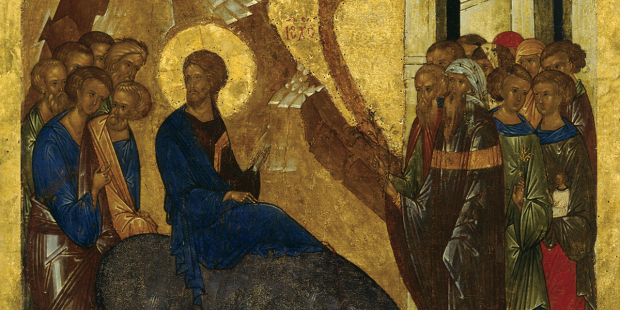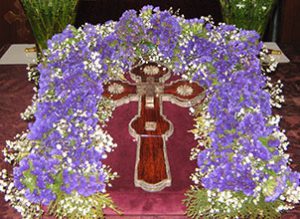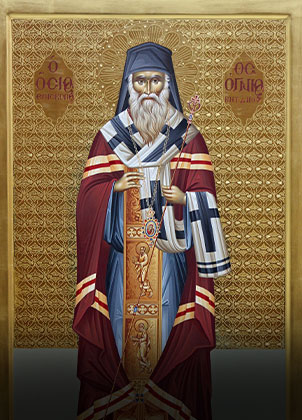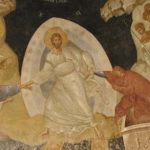In the name of the Father and of the Son and of the Holy Spirit.
Brothers and sisters, we now celebrate the glorious entry into Jerusalem of our Lord Jesus Christ.
In the life of Jesus this was the only visible triumph. Up to that day, He always rejected all attempts to glorify Him. But six days before His Cross, He not only accepted to be glorified, He Himself provoked and arranged this glorification.
How may we explain this?
At that time people of Judea eagerly awaited the Messiah to come, but what were their ideas of the Messiah? They were waiting for a mighty ruler, who would defeat Romans and establish a world superpower with Jerusalem as its capital. Even the Apostles shared this misunderstanding.
That’s why the Lord forbade His disciples to say to people that He was the Christ – the Messiah. If such a rumour about Him had spread among the people, they would have revolted against the Romans, and there would have been bloodshed.
Why then did the Lord on the day of His entry into Jerusalem accept people’s fervour, which was based on a dangerous prejudice? Moreover, when Pharisees asked Jesus to stop His disciples, who were crying: “Blessed is the King Who comes in the name of the Lord”, He answered, ‘I tell you, if these were silent, the very stones would cry out.” (Luke 19)
It was necessary that at least in this last entry to Jerusalem before His Cross, all the people would recognise Him as the Messiah, the King and the Redeemer of Israel.
However, the entry of the Lord was both solemn, and at the same time humble.
As the prophet Zechariah foretold this: “Rejoice greatly, O daughter of Zion! Shout, O daughter of Jerusalem! Behold, your King is coming to you; He is just and having salvation, He is humble and riding on a donkey, a colt, the foal of a donkey” (Zech. 9).
The King isn’t carried in a chariot, pulled by horses, instead He rides a donkey; in place of a guard the King is surrounded by poor and simple men, His disciples.
Probably rich and proud people, the Jewish high priests and Pharisees, were looking scornfully at the Lord’s glorious entry, which appeared to them as something low and miserable. This is reflected in the Gospel, as St Mathew says: “And when He entered Jerusalem, the whole city was stirred up, saying, “Who is this?” And the crowds said: ‘This is Jesus, the prophet from Nazareth of Galilee.” (Matth. 21)
Disregard is heard in this phrase. Indeed the Jews looked down at Galileans, and Nazareth was out of favour even among the Galileans themselves.
It may seem unexplained, why the people, who greeted Jesus with such enthusiasm, soon turned away from Him crying: “Away with Him, away with Him! Crucify Him!” However people’s love of a leader soon turns into hatred, if he doesn’t fulfil their expectations.
Christ’s Kingdom is not of this world. Unlike the kingdoms of the world, Christ’s Kingdom is based not on force, but on spiritual freedom, willing obedience and love.
When Pilate asked Jesus: “So you are a king?” He answered: “You say rightly that I am a king. For this purpose I was born and for this purpose I have come into the world—to bear witness to the truth. Everyone who is of the truth listens to my voice.” (John 18)
Thus the subjects of the Heavenly King are those who are of the truth; they listen to His voice. The Lord Jesus Christ reigns in the conscience of those who believe in Him. Thus His Kingdom is the Church.
When asked about His Kingdom, Jesus said to Pilate: “My kingdom is not of this world” (John 18). Pilate didn’t understand Christ’s teaching about His spiritual Kingdom, but the Thief crucified with Jesus believed in His Kingdom and became its citizen, when he said: “Lord, remember me when You come into Thy kingdom.” (Luke 23)
If Christ’s Kingdom is not of this world, it is necessary that His subjects won’t be of this world. The Lord says to His disciples at the Last Supper: “If the world hates you, you know that it hated Me before it hated you. If you were of the world, the world would love its own. Yet because you are not of the world, but I chose you out of the world, therefore the world hates you.” (John 15)
And in the end of His talk He says: “Be of good courage, I have overcome the world” (John 16).
From this day Passion Week starts. The Church invites us to follow our Lord through this week.
In one of the hymns of Great Monday we sing: “As the Lord was coming to His voluntary Passion, He said to the Apostles on the way, ‘Behold, we are going up to Jerusalem, and the Son of Man will be betrayed, as it is written of Him.’ Come, then, and with our minds now purified, let us also go with Him and be crucified with Him and die for Him to the pleasures of this life, so that we may also live with Him and hear Him when He says, “No longer am I going up to the earthly Jerusalem to suffer there, but rather I am ascending to my Father and your Father, and to my God and your God. And I will raise you up with me to the Jerusalem on high in the Kingdom of heaven.”
Amen









